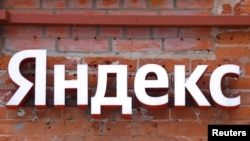As Russia tries to control the narrative on the war in Ukraine, online news providers and aggregators find themselves in tricky territory.
Apps and even people who share information online have been hit with penalties. A Russian court in July fined Google more than $370 million for refusing to remove information about the war, including from YouTube. And earlier this month, a Siberian court sentenced a freelance journalist to eight months’ corrective labor for “knowingly distributing” what it called “false information” about the army in social media posts.
Andrei Novashov, who had worked for media outlets including the RFE/RL Siberia Realities project, is also barred from posting online for a year.
Kirill Goncharov, an opposition politician for the Yabloko party in Moscow, told VOA that since February 2022 Russia has been pursuing a goal of a complete “cleansing” of the internet.
Even discussions on Russian social media sites such as Vkontakte, or VK, can create legal issues, Goncharov said.
“The internet in Russia is censored, but this is actually part of the big picture — absolutely everything is censored here, from the media to entertainment content,” he said.
Lev Gershenzon, the founder of The True Story, an independent news aggregator, told VOA that data from the Russian portal Li.ru appears to show smartphone users in Russia being redirected to sites known for pushing pro-Kremlin narratives.
According to media analysts, Russian search engines Yandex and Mail.ru tend to promote pro-Kremlin media sources on the war. But data on the analytics website Li.ru suggests that the trend is also seen with Android users accessing their Google feed.
Between January and March of this year, Android Google referrals on Li.ru showed users being directed to outlets that media analysts have said publish biased, pro-Kremlin coverage of the Russian invasion of Ukraine or are known for pro-Kremlin narratives.
Gershenzon, who until 2012 was a head at the Yandex news division, said the data shows millions of clicks per day from Google and Yandex directing users to such sites.
“These are most likely referrals from the Google Discover service,” Gershenzon told VOA. “When an Android user, for example, opens a new page in the Google Chrome browser on his phone … he has not searched for anything yet, but some 'interesting' headers have been generated already.”
If users follow those links, he said, they could “be influenced by the ‘pro-Kremlin’ point of view."
A spokesperson for the Google media team said the company could not comment on “third-party analytics reports” and that they were unclear where the date was coming from or how it was being tracked.
Google's press office didn't respond to VOA questions on whether the company makes efforts to exclude websites that promote disinformation on the war in Ukraine from its news feed on smartphones in Russia or to change its algorithms for users in Russia to prioritize more credible media.
Goncharov said he doesn’t think the blame lays with Google and that the company is “helping a lot to fight against fake news and Russian propaganda."
But, said Goncharov, "The Kremlin allocates huge funds for spreading propaganda on the internet. Large agencies receive contracts from the Kremlin and work in this direction. They do ‘sowing,’ fill the internet with information that is beneficial to the Kremlin, and as a result, users receive this information."
VOA could not independently verify the Li.ru data, but to get a snapshot of what users see on their phones, VOA asked five people in different Russian cities to screenshot their personalized news feeds.
In comparing the top recommendations for each feed, VOA found that around 12 of the 40 articles in those screenshots were linked to pro-Russian war narratives. One link referred the user to an independent media outlet. The remainder were for non-political articles though many of those recommended websites had pro-Kremlin narratives elsewhere on their homepages.
Staying online
Even with the obstacles, Russians can still bypass internet censorship through Virtual Private Networks, or VPNs, and other means.
One such project is Samizdat Online.
The idea for Samizdat Online was realized shortly after Russia invaded Ukraine, says its co-founder, Yevgeny Simkin.
“I thought ‘What is [Russian President Vladimir] Putin doing effectively?’ It turned out that [it was] very little. But his propaganda is indeed extraordinarily effective,” Simkin told VOA. “I quickly realized that the most important thing for Russians now is to access all the information which Roskomnadzor is blocking.”
Since February 2022, the media regulator Roskomnadzor has blocked access to thousands of news websites, including the Russian-language services of the VOA, BBC and Deutsche Welle (DW), and some social media, including Facebook.
Samizdat Online operates in several languages and gives users in several countries access to information blocked in their homeland.
“We see a pretty serious flow of users from Belarus, a huge contingent from Russia and from Iran, which we also included,” said Simkin. “We don’t discriminate against autocrats; we try to expose them all in the same way.”
Samizdat Online publishes about 15 articles per day from 50 publications, translating them into different languages.
A unique feature is that access to the materials does not require a VPN. Each article has a unique link, which makes attempts to block access ineffective.
Simkin said that his site’s name — which means “self-publishing”— is a call back to Soviet history when pamphlets were made without the authorities' knowledge.
"We rely on historical samizdat, which helped people,” said Simkin. “And our mechanism is exactly the same: Those links we create can be sent to anyone. The people who receive them don't need any additional mechanisms to click on them and read what's there."
Simkin said that in theory, social networks such as Facebook that are currently blocked in Russia, could be added to the Samizdat Online system. He expects that in the future, such schemes will be actively used to bypass blocking.
This story originated in VOA’s Russian Service.






